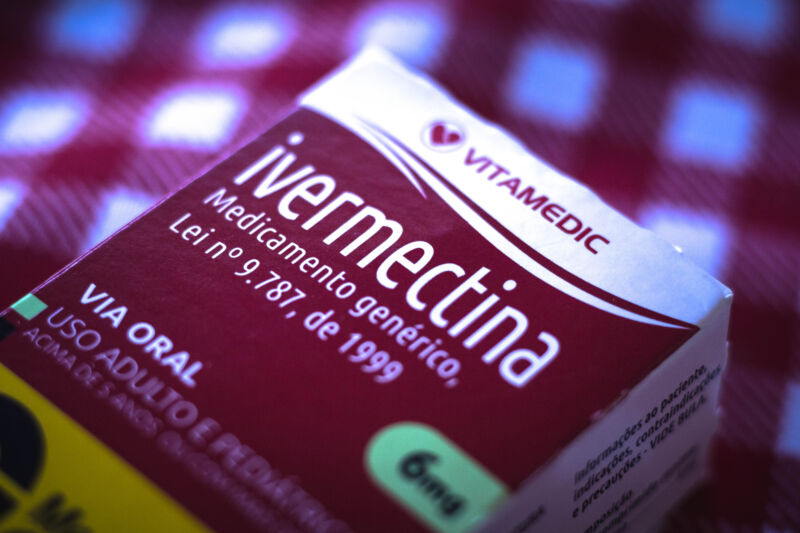
The largest clinical trial to date on the use of the antiparasitic drug ivermectin against COVID-19 concluded that the drug is completely ineffective at treating the pandemic disease, according to results published in The New England Journal of Medicine on Wednesday.
The double-blind, randomized, placebo-controlled clinical trial was primarily designed to test if ivermectin could reduce the need for hospitalization among 1,358 COVID-19 patients at high risk of severe disease. Ivermectin did not, according to the international team of researchers behind the trial, dubbed TOGETHER. "We did not find a significantly or clinically meaningful lower risk of medical admission to a hospital or prolonged emergency department observation with ivermectin," the researchers reported.
The folks with TOGETHER also found that the drug failed to reduce all other secondary outcomes of COVID-19, including the time to recovery, time to viral clearance on PCR test, time spent in the hospital, the need for mechanical ventilation, the duration of mechanical ventilation, death, or the time to death. "We found no important effects of treatment with ivermectin on the secondary outcomes," the researchers wrote.Seriously, y’all
The findings align with some smaller trials and current medical consensus that ivermectin has not proven effective at treating COVID-19. Yet ivermectin—a drug typically used by humans to treat gastrointestinal parasites and river blindness and commonly used in veterinary medicine for deworming horses, cows, cats, and dogs—has become a wildly popular COVID-19 treatment.
Ivermectin's popularity is fueled by misinformation, Republican politics, and dubious data. An early study using cells in petri dishes suggested that ivermectin has antiviral properties at very high concentrations and could inhibit the pandemic coronavirus, SARS-CoV-2. But the result of trials and other clinical studies have been mixed at best. Some small studies—many of which are of poor quality—have claimed that ivermectin has benefits against COVID-19. A few meta-analyses, including those questionable studies, have also provided a veneer of efficacy.
This has led to fierce debates about ivermectin online as well as skyrocketing use. In December 2020, ivermectin prescribing in the US increased 964 percent over prepandemic prescription levels. This giant increase was estimated to cost health insurers more than $129 million annualized. Not everyone desperate to take the drug was received a prescription, so some turned to veterinary formulations. This caused spikes in poisonings and led the Food and Drug Administration to release an unusual warning: "You are not a horse. You are not a cow. Seriously, y'all. Stop it."
The researchers behind the new trial say their data should finally put ivermectin's use against COVID-19 to rest—though they're not expecting that to be the case.
"The overall number of events that occurred in our trial is larger than the number of all the combined events in these meta-analyses," the TOGETHER researchers noted. "The results of this trial will, therefore, reduce the effect size of the meta-analyses that have indicated any benefits." But, they go on, "Given the public interest in ivermectin and the support of its use by paramedical groups, we suspect that there will be additional criticism that our administration regimen was inadequate."
Trial design
The trial took place across 12 public health clinics in Brazil from March 23, 2021, to August 6, 2021, enrolling 1,359 COVID-19 patients in total. Of those, 679 were randomly assigned to get ivermectin, and 679 were randomly assigned a placebo. All of the enrolled patients were ages 18 or older, tested positive for COVID-19 on a rapid test, and had onset of COVID-19 symptoms within seven days. All had at least one condition that put them at higher risk of severe COVID-19, such as being older than age 50 or having diabetes, high blood pressure, cancer, or lung disease. All of the patients were monitored for 28 days, with contact on days 1, 2, 3, 4, 5, 7, 10, 14, and 28 from the time of their randomization. The people in the ivermectin group received a dose of 400 micrograms per kilogram for the first three days.
The researchers noted they initially planned to give patients a smaller dose of ivermectin for only one day. But after receiving "feedback from advocacy groups," they extended the experimental treatment to three days at a relatively high dose. They also checked to ensure that the patients in the trial didn't have a history of ivermectin use, given its popularity in Brazil.
The trial's main goal was to see if taking ivermectin early in an infection could reduce the risk of hospitalization in high-risk patients. However, Brazil had periods when hospitals were overwhelmed with patients, turning some sufferers away. As such, the researchers also counted visits to emergency departments when a patient was kept for observation for six or more hours due to worsening COVID-19 symptoms, which was considered a proxy for hospitalization if hospital capacity was not limited.
Overall, the researchers saw no significant difference in the number of hospitalizations or prolonged emergency department visits between the ivermectin and placebo groups. Exactly 100 participants (15 percent) in the ivermectin group had that outcome, while 111 (16 percent) of the placebo group did. The finding didn’t change when the researchers narrowed their analysis to exclude a handful of people who went to the hospital within 24 hours of starting the trial and people who didn't report 100 percent compliance with their ivermectin or placebo regimens. The researchers also saw no benefits among the secondary outcomes. And in a subgroup analysis, they saw no benefit in patients who happened to start ivermectin within three days from the onset of symptoms instead of seven days.
Health - Latest - Google News
April 01, 2022 at 05:17AM
https://ift.tt/wF0zHZM
Ivermectin worthless against COVID in largest clinical trial to date - Ars Technica
Health - Latest - Google News
https://ift.tt/cK59kn3

No comments:
Post a Comment